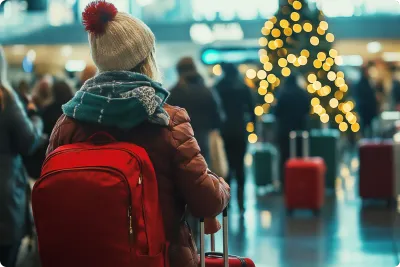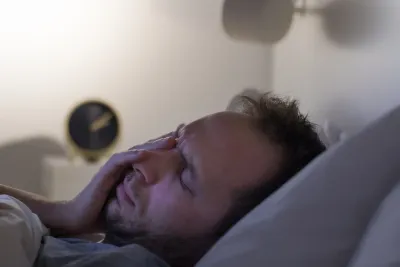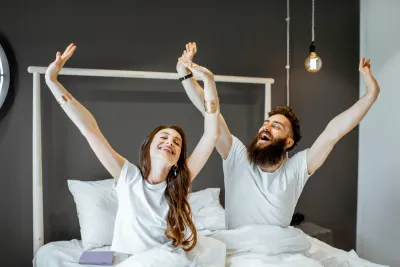
Key Takeaways
- Sleep Travel Struggles: Hotel noise, strange beds, and multiple time zone changes can make restful sleep tough while traveling—but a few small tweaks can make all the difference.
- Relaxation Habits: Deep breathing, Yoga Nidra, or soothing playlists can calm your nervous system, lower heart rate, and help your body wind down before bed.
- Consistent Routine: Sticking to a regular sleep schedule—even on vacation—helps keep your circadian rhythm balanced and makes it easier to adjust to new environments.
- Comfort Essentials: Bring familiar items like your own pillow, cozy pajamas, or a white noise machine to recreate your home sleep setup wherever you are.
- Smart Hotel Choices: Request upper-floor rooms away from elevators and vending machines, use blackout curtains, and keep the room cool for optimal rest.
You finally dozed off after driving 13 hours straight. You hoped to get some solid sleep before traveling through two states to your destination, and you wanted nothing more all day than to just lie down, stretch your feet, and relax.
Then someone down the hall laughs. The hotel sign outside blinks slightly through a gap in the curtain. The elevator next to your room screeches as it arrives at your floor, and the microwave clock catches your left eye's attention.
You grab your phone to check the time. You're up for the rest of the night.
Traveling can be fun whether you're driving or flying, on business trips or with family and friends, or simply getting away from your busy schedule for a while. But staying away from home isn't always entertaining when it comes to getting quality sleep.
How to Sleep While Traveling
Waking up completely rested from a good night’s sleep while traveling is most likely all travelers’ goal. However, it’s not always easy to obtain. In an effort to help you receive quality sleep during your travels, we’ve listed some of the best tips to help you sleep more comfortably while traveling.

Breathing Exercises
Traveling can be exhausting and stressful. Winding down with breathing exercises and a calming Yoga Nidra session before bed can help quiet your mind, ease anxiety, and prep your body for quality rest. New to yoga? Check out our getting started with yoga, includes helpful tips.
Read More: For a better understanding of how meditation can improve your sleep, read the following blog Meditation: A Simple and Safe Way to Help You Sleep
Study: Performing yoga can help with the quality of your sleep, duration of sleep, and sleep efficiency. [1]
Listen to Soothing Music
Music has a strong and mixed effect on the mind and body and can positively affect sleep. Music can slow your breathing, lower blood pressure, lower heart rate, ease muscle tension, reduce anxiety and stress, and release hormones.
Similarly, listening to soothing podcasts can also help you relax and improve sleep, especially when traveling.
Sleep Study: Music can improve your sleep, including different types of sleep disorders, including sleep apnea and insomnia. [2]
Stick to a Sleep Schedule
Sticking to a sleep schedule is crucial for getting a good night’s sleep, especially when traveling. Try to go to bed and wake up at the same time every day, including weekends, to help regulate your body’s internal clock.
Related Blog: Learn more about how your body's natural sleep-wake cycle affects your travel experiences, check out our related blog: What is Circadian Rhythm and How It Works. Increasing your core body temperature can trigger your circadian rhythm, your body clock.
Avoid caffeine and napping close to bedtime, and aim to get at least seven hours of sleep each night. This consistency will help your body and mind feel rested and refreshed, reducing the impact of long term sleep deprivation and making it easier to adjust to new environments when traveling.
Aromatherapy
Packing a full suitcase can sometimes become challenging, but packing aromatherapy when traveling is easy. If you're having difficulty falling asleep quickly, aromatherapy can help with relaxation.
Types of aromatherapy include diffusers, clay masks, hot and cold compresses, bathing salts, aromatic sprays or mists, and more.
Give Yourself Time to Fall Asleep
Trying to sleep in a new environment can be tough, so give yourself more time to fall asleep, even if it means going to bed a little earlier. It can take about a day to adjust to your new schedule if you’re traveling across time zones. If possible, try to set your alarm to match the timezone you’re visiting so that you are well-adjusted once you’re there.
Establishing a regular wake up time can also help reinforce your body's sleep-wake cycle, making it easier to adapt to the new environment.
Traveling with Sleep Medications
If you rely on medication or supplements to help you sleep, don't forget to pack them! It's also a good idea to touch base with your doctor or sleep specialist before your trip. They can help you address any specific sleep concerns you might have and make sure you have everything you need to manage your sleep health while traveling.
Bring along a copy of your prescription and a list of all your medications – it's always a good idea to be prepared. By planning ahead, you can minimize disruptions to your sleep and enjoy a more restful and enjoyable trip.
Creating a Restful Environment
Creating a restful environment is important for getting a good night’s sleep. Start by establishing a relaxing bedtime routine, such as reading a book or listening to soothing music, to help calm your mind and body. Avoid stimulating activities before bedtime, such as watching TV or scrolling through your phone, as these can disrupt sleep.
Instead, focus on creating a dark, quiet, cool environment promoting sleep. Using blackout curtains, earplugs, or a white noise machine can help create the perfect setting for quality sleep.
Establish a Relaxing Bedtime Routine
Establishing a relaxing bedtime routine is essential for getting a good night’s sleep. Try to avoid stimulating activities before bedtime, and instead opt for relaxing activities like reading a book or listening to soothing music.
Additionally, consider practicing relaxation techniques, such as deep breathing or meditation, to help calm your mind and body before sleep. These practices can make it easier to sleep and improve your overall quality of sleep, allowing you to wake up feeling refreshed and ready for the day ahead.

Find a Home Away From Home
When traveling, creating a comfortable and restful environment that feels like home can significantly improve your sleep. Start by choosing accommodations wisely. Whether booking a hotel room or a rental property through platforms like Airbnb or VRBO, look for options that are quiet, dark, and cool to promote better sleep. Rentals often provide a more home-like atmosphere, which can help you feel more at ease compared to traditional hotel stays.
To enhance your sleeping environment, consider investing in a portable white noise machine or using earplugs to block out disruptive sounds. Bringing a few familiar items from home, such as your favorite pillow or blanket, can also provide comfort and relaxation, making it easier to stay asleep. Plus, natural light exposure during the day can help regulate your sleep-wake cycle, contributing to a more restful night.
While planning your trip, remember that good sleep is just as important as booking flights, reserving rooms, and organizing your itinerary. Prioritizing your sleep will help you stay physically and mentally refreshed, ensuring you make the most of your travels.
Planning a trip, booking a flight, reserving a room, and organizing your itinerary are important for traveling. So is sleeping. Getting the right amount while you travel is vital for you physically and mentally while away from home.
Create a Great Hotel Experience for Better Sleep Quality
Some hotel pillows will always be too flat, and elevators will most likely screech every time they arrive at a floor, ice makers will hum, outside lights will somehow find a way to shine in your room, and hallways will continue to create some of the loudest noises.
But according to Smarter Travel, you can ensure a great hotel experience even before you arrive at the hotel: [3]
- Request a room on an upper floor away from the elevators.
- Book a room midway down the hallway away from ice makers and vending machines.
- Avoid rooms facing a pool due to loud noises from pool guests and echoes from the water.
- Research if the hotel will be undergoing renovations.
- Ask the hotel about pillow options.

Vacation Packing Tips
Here are just a few suggestions to combat the “new sleeping environment blues” when away from home:
- Cozy pajamas that will help you feel like you’re at home
- Favorite t-shirt
- Cozy bathrobe or slippers.
- Continue with your normal routine: if you typically feel best getting to bed around 10 pm, try your best to stick to that.
- Pack the right accessories
How to Sleep Better in a Hotel
Your sleeping space will most likely be limited to a hotel bed, someone’s couch, or a bed you’re just not used to while traveling. The familiarity of bringing your favorite pillow or travel pillow from home could provide more comfort than you realize.
Common Sleep Disturbances in Hotels
A study of 2504 men and women discovered that 95 percent of participants were affected by different sleep disturbances, from noisy hallways to lousy pillows when away from home. [4]
Participants reported the following disruptions in order from highest to lowest prevalence when staying in hotels:
- Poor pillow
- High temperature
- Poor mattress
- Poor duvet/bedding
- Noise from the street
- Bad indoor climate
- Too much light exposure from windows
- Noise from ventilation
- Noise from the corridor
- Noise from other rooms
- Noise from restaurants or pubs
- Small bed
- Low temperature
- Noise from an elevator
- Noise from the lobby
The key to helping travelers sleep better in hotels is – hoteliers – according to one study. While a mint on the pillow is nice to see in the morning, hoteliers should focus on encouraging travelers to realign their circadian rhythm, or internal clock, to the new time zone. This will “enable guests to get a good night’s sleep on the destination’s clock, rather than that of their origination point.” [5]
Final Thoughts
Achieving good sleep while traveling can significantly enhance your overall trip experience. By incorporating these tips into your travel routine—from optimizing your sleep environment to gradually adjusting your sleep schedule—you can reduce jet lag symptoms, combat travel fatigue, and wake up feeling refreshed and ready to explore your destination.
Don't let your sleep suffer while traveling. Enjoy time with your friends and family, or just by yourself and get the quality sleep you need. Good sleep doesn't have to stay home while you travel. Take it with you.
Frequently asked questions
Why Am I Not Able to Sleep While Traveling?
You’re not alone — sleep and travel don’t always mix well. Between time zone shifts, new surroundings, and unfamiliar sounds, your brain stays partially alert in “safety mode.” Add in temperature changes, screen time, or late-night arrivals, and it’s no wonder quality sleep feels like a layover instead of a destination.
How to Sleep Comfortably While Traveling?
How to Sleep Comfortably While Traveling
- Pack Smart: Bring noise-canceling headphones, an eye mask, and a small pillow for instant comfort anywhere.
- Set the Mood: Keep your sleep environment cool and dark—use blackout curtains or a sleep mask to block unwanted light.
- Stick to Routine: Go to bed and wake up at similar times to help your body adjust faster.
- Limit Screens: Power down at least 30 minutes before bedtime to let your mind unwind.
- Stay Hydrated (Smartly): Drink enough water during the day, but cut back before bed to avoid midnight bathroom breaks.
- Try Sleep Technology: Use a temperature-regulating device or sleep app to maintain your ideal sleep conditions on the go.
References
[1] Halpern J;Cohen M;Kennedy G;Reece J;Cahan C;Baharav A; “Yoga for Improving Sleep Quality and Quality of Life for Older Adults.” Alternative Therapies in Health and Medicine, U.S. National Library of Medicine. View Study
[2] HX;, Wang CF;Sun YL;Zang. “Music Therapy Improves Sleep in Acute and Chronic Sleep Disorders: A Meta-Analysis of 10 Randomized Studies.” International Journal of Nursing Studies, U.S. National Library of Medicine. View Study
[3] Elissa Leibowitz Poma, “33 Ways to Sleep Better at a Hotel.” SmarterTravel, SmarterTravel, 2 Mar. 2020.
[4] Pallesen, Ståle, et al. ““I Wish I’d Slept Better in That Hotel” – Guests’ Self-Reported Sleep Patterns in Hotels.” Scandinavian Journal of Hospitality and Tourism, vol. 16, no. 3, 20 Aug. 2015, pp. 243–253, 10.1080/15022250.2015.1074938. Accessed 23 Jan. 2022.
[5] Maas, J. “Beyond the Pillow Mint: How Hotels Can Help with Jet Lag Symptoms.” The Cornell Hotel and Restaurant Administration Quarterly, vol. 44, no. 3, June 2003, pp. 37–43, 10.1016/s0010-8804(03)90268-0. Accessed 27 Apr. 2019.








